惠特曼的草叶集简介(英文)
草叶集 英文版
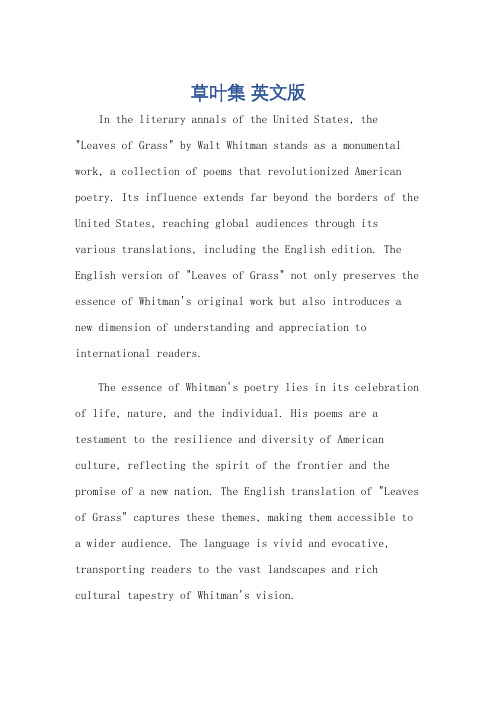
草叶集英文版In the literary annals of the United States, the "Leaves of Grass" by Walt Whitman stands as a monumental work, a collection of poems that revolutionized American poetry. Its influence extends far beyond the borders of the United States, reaching global audiences through its various translations, including the English edition. The English version of "Leaves of Grass" not only preserves the essence of Whitman's original work but also introduces a new dimension of understanding and appreciation to international readers.The essence of Whitman's poetry lies in its celebration of life, nature, and the individual. His poems are a testament to the resilience and diversity of American culture, reflecting the spirit of the frontier and the promise of a new nation. The English translation of "Leaves of Grass" captures these themes, making them accessible to a wider audience. The language is vivid and evocative, transporting readers to the vast landscapes and rich cultural tapestry of Whitman's vision.The translation of "Leaves of Grass" into English was a momentous occasion, marking a significant milestone in the history of literary translation. It was not just alinguistic exercise; it was an act of cultural exchange and understanding. The English edition introduced Whitman's unique voice and perspective to a global audience, sparking interest and debate among scholars and readers alike.The impact of the English version of "Leaves of Grass" is felt in various ways. It has influenced generations of writers and poets, inspiring them to explore new themes and techniques. The work's emphasis on individuality and self-expression has resonated with readers seeking to express their own identities and experiences. The poetry's celebration of nature and the beauty of the world has also been a source of inspiration for environmentalists and conservationists.The English edition of "Leaves of Grass" has also contributed to the global dissemination of American literature. Its popularity abroad has helped shape the perception of American culture and values in international forums. The work's themes and images have become part ofthe global literary canon, influencing writers and thinkers across the globe.In conclusion, the English version of "Leaves of Grass" is not just a translation; it is a bridge between cultures, a medium for understanding and appreciation. It preservesthe essence of Whitman's original work while introducingnew dimensions of meaning and significance to international readers. The influence of this translation is felt in the realm of literature, culture, and global understanding, making it a vital part of the literary landscape.**《草叶集》:英文版之魅力与传播**在美国文学史上,沃尔特·惠特曼的《草叶集》是一部具有里程碑意义的作品,这部诗集革命性地改变了美国诗歌的面貌。
草叶集(中英对照版)第三卷歌唱自我(第四十二节)
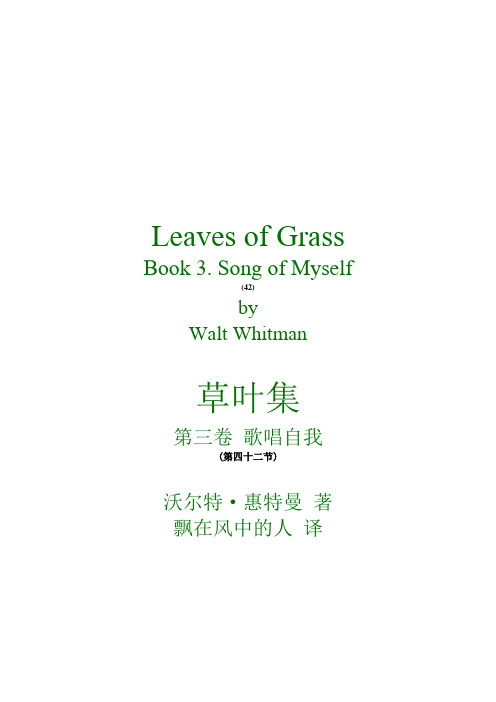
Leaves of Grass Book 3. Song of Myself(42)byWalt Whitman草叶集第三卷歌唱自我(第四十二节)沃尔特·惠特曼著飘在风中的人译LEAVES OF GRASS草之叶Come, said my soul,来吧,我的灵魂说道,Such verses for my Body let us write, (for we are one,)为了我的肉体,让我们写下这些诗,(因为我们是密不可分的整体)That should I after return,这样如果以后我将归来,Or, long, long hence, in other spheres,也许,在很久,很久以后,在另外的星体或空间,There to some group of mates the chants resuming,在那里朝着某一群伙伴,我将把这些颂歌重新颂唱,(Tallyi ng Earth’s soil, trees, winds, tumultuous waves,)(把地球的土壤、树木、风儿和汹涌波浪逐一地清点)Ever with pleas’d smile I may keep on,我会带着喜悦的微笑永不放弃,Ever and ever yet the verses owning—as, first, I here and now永永远远地把这些诗篇拥有——就像此时此刻的我一样,首先,Signing for Soul and Body, set to them my name,为了灵魂和肉体而签下名字,把我的名字嵌在它们上面。
Walt Whitman沃尔特·惠特曼BOOK III第三卷S ONG OF M YSELF (42)歌唱自我(第四十二节)42A call in the midst of the crowd,这是从人丛的中央传出一声呼唤,My own voice, orotund sweeping and final.它是发自我自己的声音,宏大,横扫一切,决定了一切。
草叶集(中英对照版)第四卷亚当的孩子(第一部分)
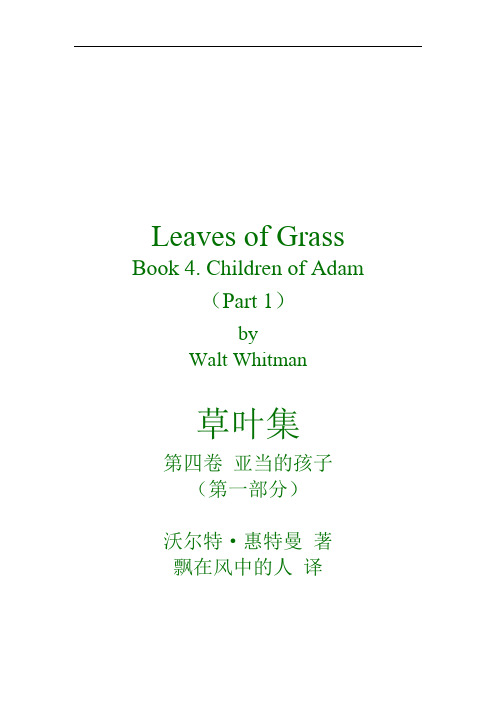
Leaves of Grass Book 4. Children of Adam(Part 1)byWalt Whitman草叶集第四卷亚当的孩子(第一部分)沃尔特·惠特曼著飘在风中的人译LEAVES OF GRASS草之叶Come, said my soul,来吧,我的灵魂说道,Such verses for my Body let us write, (for we are one,)为了我的肉体,让我们写下这些诗,(因为我们是密不可分的整体)That should I after return,这样如果以后我将归来,Or, long, long hence, in other spheres,也许,在很久,很久以后,在另外的星体或空间,There to some group of mates the chants resuming,在那里朝着某一群伙伴,我将把这些颂歌重新颂唱,(Tallying Earth’s soil, trees, winds, tumultuous waves,)(把地球的土壤、树木、风儿和汹涌波浪逐一地清点)Ever with pleas’d smile I may keep on,我会带着喜悦的微笑永不放弃,Ever and ever yet the verses owning—as, first, I here and now永永远远地把这些诗篇拥有——就像此时此刻的我一样,首先,Signing for Soul and Body, set to them my name,为了灵魂和肉体而签下名字,把我的名字嵌在它们上面。
Walt Whitman沃尔特·惠特曼BOOK IV. CHILDREN OF ADAM (part 1)第四卷亚当的孩子(第一部分)T O THE G ARDEN THE W ORLD向着乐园,这个世界To the garden the world anew ascending,向着乐园,这个世界又一次攀登,Potent mates, daughters, sons, preluding,正当盛年的配合成对的男女,为儿女们拉开了序幕,The love, the life of their bodies, meaning and being,爱情和他们肉体里的生命,充满意义真实存在,Curious here behold my resurrection after slumber,奇怪啊,在这儿能看到从沉睡中复活过来的我,The revolving cycles in their wide sweep having brought me again,那些回转着的循环啊,在它们悠长的巡游中,又一次地把我带来,Amorous, mature, all beautiful to me, all wondrous,充满爱情,已经成熟,我看到一切都如此美丽,一切都如此神奇,My limbs and the quivering fire that ever plays through them, for reasons, most wondrous, 我有理由说,最为神奇的,是我的肢体,还有那总是通过它们而起舞的跃动的火焰,。
惠特曼的草叶集简介英文

On July 4, 2005, we celebrated the 150th anniversary of what is possibly the greatest book of American poetry ever written. in 1855, Walt Whitman published his first edition of Leaves of Grass, a slim volume consisting of twelve untitled poems and a preface.
Leaves of Grass: Subjects and Style
Whitman's great subject was America, but he wrote on an expansive variety of smaller subjects to accomplish the task of capturing the essence of this country.
Some of his many subjects included slavery, democracy, the various occupations and types of work, the American landscape, the sea, the natural world, the Civil War, education, aging, death and immortality, poverty, romantic love, spirituality, and social change.
Leaves of Grass
Well-known poems in the 1855 edition include "Song of Myself," a long poem in fifty-two sections, which is considered by many to be his masterpiece. It contains such notable lines as "I am large, I contain multitudes" and "I bequeath myself to the dirt to grow from the grass I love, / If you want me again look for me under your boot-soles."
草叶集中英对照
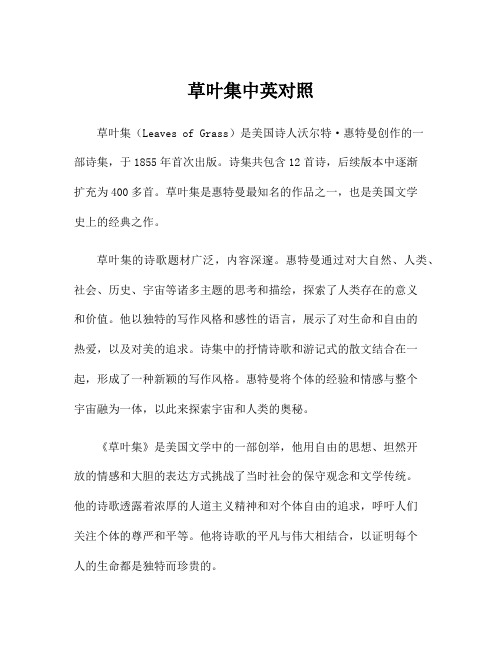
草叶集中英对照草叶集(Leaves of Grass)是美国诗人沃尔特·惠特曼创作的一部诗集,于1855年首次出版。
诗集共包含12首诗,后续版本中逐渐扩充为400多首。
草叶集是惠特曼最知名的作品之一,也是美国文学史上的经典之作。
草叶集的诗歌题材广泛,内容深邃。
惠特曼通过对大自然、人类、社会、历史、宇宙等诸多主题的思考和描绘,探索了人类存在的意义和价值。
他以独特的写作风格和感性的语言,展示了对生命和自由的热爱,以及对美的追求。
诗集中的抒情诗歌和游记式的散文结合在一起,形成了一种新颖的写作风格。
惠特曼将个体的经验和情感与整个宇宙融为一体,以此来探索宇宙和人类的奥秘。
《草叶集》是美国文学中的一部创举,他用自由的思想、坦然开放的情感和大胆的表达方式挑战了当时社会的保守观念和文学传统。
他的诗歌透露着浓厚的人道主义精神和对个体自由的追求,呼吁人们关注个体的尊严和平等。
他将诗歌的平凡与伟大相结合,以证明每个人的生命都是独特而珍贵的。
在《草叶集》中,惠特曼用“我”来代表每个人,用“你”来代表读者和整个人类。
他希望每个人能够通过诗歌来感受到与他人的共鸣和联系。
他认为每个人都是独特的,每个人都拥有无限的潜力和可能性。
他呼吁人们敞开心扉,接纳自己和他人的差异,拥抱生命的多样性和丰富性。
草叶集中的诗歌充满了对生命和自然的赞美。
惠特曼将自己视为大自然的一部分,他以植物的形象来描绘自己的生命和创作。
他通过描写大自然的美丽和神秘,表达了对生命的敬畏和对宇宙的思索。
他相信万物有灵,每个人都与宇宙相连。
他用深沉而富有节奏感的语言来表达对宇宙的赞美和敬畏,让读者能够感受到生命的力量和美好。
草叶集还涉及到社会和政治问题。
惠特曼对奴隶制度、战争、不平等等社会问题持有鲜明的立场,并通过诗歌向读者传递他的社会理念。
他呼吁人们摒弃偏见和歧视,拥抱平等和自由。
他希望通过诗歌来传递正能量,鼓舞人们追求正义和改变社会。
总的来说,草叶集是一部具有深邃思考和独特风格的诗集。
沃特尔惠特曼waltwhitman草叶集

poem lines
Song of Myself Part 1
I CELEBRATE myself, and sing myself, And what I assume you shall assume, For every atom belonging to me as good belongs to you.
American spirit
Song of Myself
1345 lines the longest poem in Leaves of Grass two principal beliefs: first, a theory of
universality; second, all things are equal in value.
?我独自在遥远的荒山野外等待猎物的出现?深深地惊喜于我的轻快和昂扬?在天晚时寻觅了一个安全的地方过夜?燃起火烤熟了刚猎到的野味?我全身酥软地躺在集拢来的叶子上我的狗和枪躺在我的身旁
Walt Whitman
One of the greatest innovators /poets in American literature(19th century) He gave America its first genuine epic poem: Leaves of Grass
Dead Poem Society
John Keating: O Captain, my Captain.
Theme of His Poems
草叶集(中英对照版)第三卷歌唱自我(第四十四节到第五十二节)

Leaves of Grass Book 3. Song of Myself(44 - 52)byWalt Whitman草叶集第三卷歌唱自我(第四十四节到第五十二节)沃尔特·惠特曼著飘在风中的人译LEAVES OF GRASS草之叶Come, said my soul,来吧,我的灵魂说道,Such verses for my Body let us write, (for we are one,)为了我的肉体,让我们写下这些诗,(因为我们是密不可分的整体)That should I after return,这样如果以后我将归来,Or, long, long hence, in other spheres,也许,在很久,很久以后,在另外的星体或空间,There to some group of mates the chants resuming,在那里朝着某一群伙伴,我将把这些颂歌重新颂唱,(Tallying Earth’s soil, trees, winds, tumultuous waves,)(把地球的土壤、树木、风儿和汹涌波浪逐一地清点)Ever with pleas’d smile I may keep on,我会带着喜悦的微笑永不放弃,Ever and ever yet the verses owning—as, first, I here and now永永远远地把这些诗篇拥有——就像此时此刻的我一样,首先,Signing for Soul and Body, set to them my name,为了灵魂和肉体而签下名字,把我的名字嵌在它们上面。
Walt Whitman沃尔特·惠特曼BOOK III第三卷S ONG OF M YSELF (44 - 52)歌唱自我(第四十四节到五十二节)44It is time to explain myself—let us stand up.现在是说清我自己的时候了----让我们都站起来吧。
惠特曼的草叶集简介(英文)PPT课件
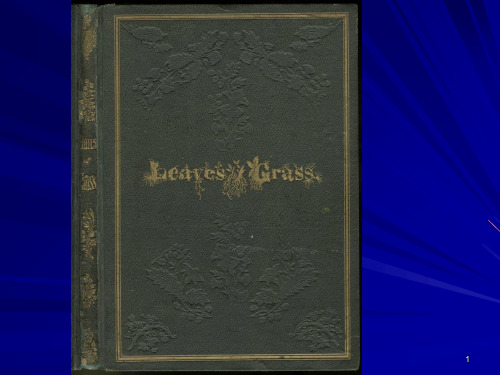
.
9
Leaves of Grass: Subjects and Style
Whitman's great subject was America, but he wrote on an expansive variety of smaller subjects to accomplish the task of capturing the essence of this country.
.
1
ves of Grass
On July 4, 2005, we celebrated the 150th anniversary of what is possibly the greatest book of American poetry ever written. in 1855, Walt Whitman published his first edition of Leaves of Grass, a slim volume consisting of twelve untitled poems and a preface.
Some of his many subjects included slavery, democracy, the various occupations and types of work, the American landscape, the sea, the natural world, the Civil War, education, aging, death and immortality, poverty, romantic love, spirituality, and social change.
.
8
Leaves of Grass
草叶集(中英对照版)第三卷歌唱自我(第三十八节到第四十一节)
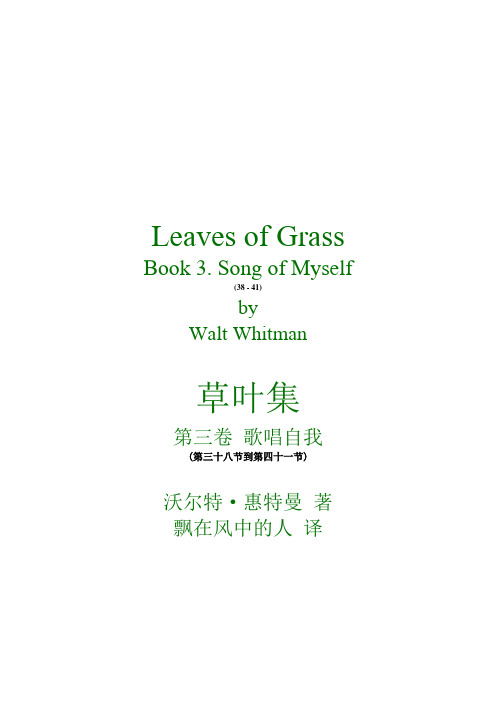
Leaves of Grass Book 3. Song of Myself(38 - 41)byWalt Whitman草叶集第三卷歌唱自我(第三十八节到第四十一节)沃尔特·惠特曼著飘在风中的人译LEAVES OF GRASS草之叶Come, said my soul,来吧,我的灵魂说道,Such verses for my Body let us write, (for we are one,)为了我的肉体,让我们写下这些诗,(因为我们是密不可分的整体)That should I after return,这样如果以后我将归来,Or, long, long hence, in other spheres,也许,在很久,很久以后,在另外的星体或空间,There to some group of mates the chants resuming,在那里朝着某一群伙伴,我将把这些颂歌重新颂唱,(Tallying Earth’s soil, trees, winds, tumultuous waves,)(把地球的土壤、树木、风儿和汹涌波浪逐一地清点)Ever with pleas’d smile I may keep on,我会带着喜悦的微笑永不放弃,Ever and ever yet the verses owning—as, first, I here and now永永远远地把这些诗篇拥有——就像此时此刻的我一样,首先,Signing for Soul and Body, set to them my name,为了灵魂和肉体而签下名字,把我的名字嵌在它们上面。
Walt Whitman沃尔特·惠特曼BOOK III第三卷S ONG OF M YSELF (38 - 41)歌唱自我(第三十八节到四十一节)38Enough! enough! enough!够了!够了!够了!Somehow I have been stunn’d. Stand back!不知怎么我已是不知所措。
Leaves of Grass,草叶集,英文PPT
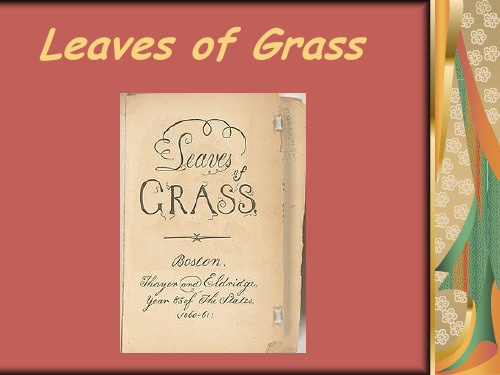
Walt Whitman was an American poet, essayist and
journalist. A humanist, he was a part of the transition between transcendentalism and realism, incorporating both views in his works. Whitman is among the most influential poets in the American canon, often called the father of free verse. His work was very controversial in its time, particularly his poetry collection Leaves of Grass, which was described as obscene for its overt sexuality. Born on Long Island, Whitman worked as a journalist, a teacher, a government clerk, and – in addition to publishing his poetry – was a volunteer nurse during the American Civil War. Early in his career, he also produced a temperance novel, Franklin Evans (1842). Whitman's major work, Leaves of Grass, was first published in 1855 with his own money. The work was an attempt at reaching out to the common person with an American epic. He continued expanding and revising it until his death in 1892. After a stroke towards the end of his life, he moved to Camden, New Jersey, where his health further declined. He died at age 72 and his funeral became a public spectacle.
草叶集(中英对照版)第一卷献辞

Leaves of Grass Book 1. InscriptionsbyWalt Whitman草叶集第一卷献辞沃尔特·惠特曼著飘在风中的人译LEAVES OF GRASS草之叶Come, said my soul,来吧,我的灵魂说道,Such verses for my Body let us write, (for we are one,)为了我的肉体,让我们写下这些诗,(因为我们是密不可分的整体)That should I after return,这样如果以后我将归来,Or, long, long hence, in other spheres,也许,在很久,很久以后,在另外的星体或空间,There to some group of mates the chants resuming,在那里朝着某一群伙伴,我将把这些颂歌重新颂唱,(Tallying Earth’s soil, trees, winds, tumultuous waves,)(把地球的土壤、树木、风儿和汹涌波浪逐一地清点)Ever with pleas’d smile I may keep on,我会带着喜悦的微笑永不放弃,Ever and ever yet the verses owning—as, first, I here and now永永远远地把这些诗篇拥有——就像此时此刻的我一样,首先,Signing for Soul and Body, set to them my name,为了灵魂和肉体而签下名字,把我的名字嵌在它们上面。
Walt Whitman沃尔特·惠特曼BOOK 1. INSCRIPTIONS第一卷献辞O NE’S-S ELF I S ING我歌唱的是人的自我One’s-self I sing, a simple separate person,我歌唱的是人的自我,一个简单而独立存在着的个人,Yet utter the word Democratic, the word En-Masse.而民主和大众集体,则将是我歌中的唱词。
walt whitman惠特曼及作品简介

O Captain! My Captain!
• O Captain! my Captain! rise up and hear the bells; • Rise up--for you the flag is flung--for you the bugle trills, • For you bouquets and ribbon‟d wreaths--for you the shores a
Free verse
• “自我”& “个性”
--- The distinctions in this brief poem are:
• One's-Self/En-Masse, • separate person/Democratic • physiognomy/brain • Female/Male • laws divine/Modern
• 3. What does Whitman mean by the term of "the Modern
Man"? • He means that a man should be free from any prejudice and pride, totally different from the traditional one, that is full of bias.
crowding, • For you they call, the swaying mass, their eager faces turning; • Here Captain! dear father! • This arm beneath your head! • It is some dream that on the deck • You've fallen cold and dead.
草叶集
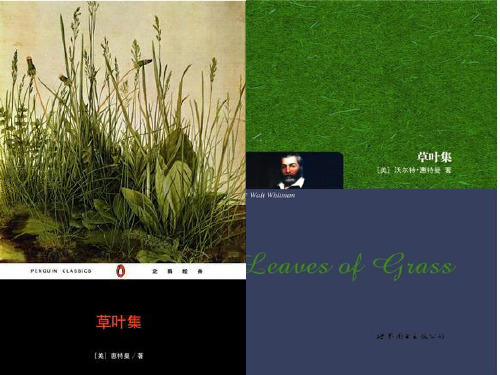
The estimate of
leaves of grass
•
惠特曼写的草叶集是我喜欢的。许 多诗中的一部分。他写了许许多多的 诗。然后他把自己的诗都归纳在一个 集子里面。他叫它草叶集。于是瓦尔 特有了自己的诗集。名字就叫草叶集。 草叶集里面写了很多事物。很大胆的 描写,成为一种风尚。他是瓦尔特的 颂歌。高亢的颂歌。他歌颂了他的船 长,歌颂男女肉......
The covers of
leaves of grass
• 你们认识 我吗?
沃尔特· 惠特曼Walt Whitman(1819~ 1892) 国籍:美国 惠特曼是美国十九世纪杰出的民主诗 人。他出身于农民家庭。当过木工、 排字工、教师、报纸编辑、职员。他 一生创作了大量诗歌,编入《草叶 集》。惠特曼的创作分三个时期。南 北战争前,他的诗歌主要是反对奴隶 制和民族压迫,歌颂自由和民主,歌 颂劳动和劳动人民,描写大自然和人。 这时期创作了《自己之歌》、《一路 摆过布鲁克林渡口》等诗篇。南北战 争期间,他激励人们投入反奴隶制战 争,歌颂战争英雄,哀悼被刺的林肯 总统。小说诗歌文学作品有诗集《桴 鼓集》。战后,惠特曼的诗歌揭露资 产阶级民主的虚伪,讴歌欧洲革命运 动,赞颂人类物质文明。诗作有《神 秘的号手》、《通向印度之路》等。 在艺术上,惠特曼打破传统的诗歌格 律,创造了"自由体"的形式,借以充 分地表达自己的思想感情。他的创作 对欧美诗歌的发展影响极大。《自己 之歌》、《桴鼓集》、《一路摆过布 鲁克林渡口》、《神秘的号手》、 《通向印度之路》等。
•
最喜欢这一句:“哪里有土,哪里 有水,哪里就长着草。”这是一本对 自由,民主的美好畅想,描述着世上 最为平凡,普通且密密成群,生而不 息的事物。喜欢这本书最主要原因是, 这部诗集的风格,年轻,有朝气,粗 犷,有那么一点肆无忌惮,带有一种 自信,自以为是个先知和代言人,语 言带点先知的口吻。......
开山之作(3):沃尔特·惠特曼之《草叶集》
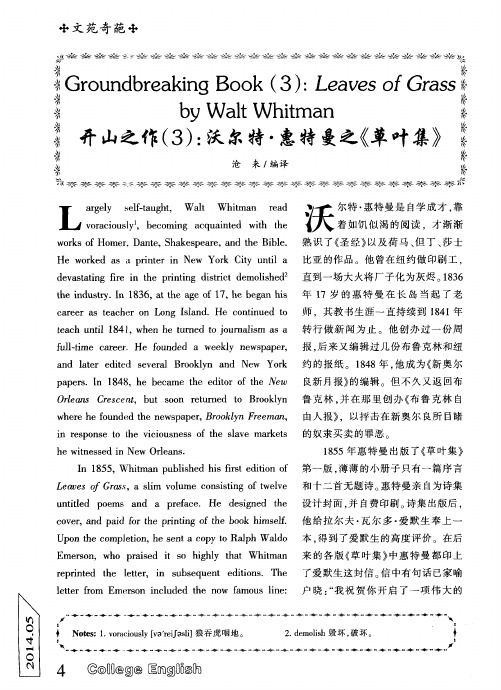
1 8 5 5年 惠 特 曼 出版 了 《 草 叶 集》
I n 1 8 5 5 , Wh i t ma n p u b l i s h e d h i s i f r s t e d i t i o n o f 第 一版 , 薄 薄 的小册 子 只有一 篇 序言
p a p e r s . I n 1 8 4 8 , h e b e c a me t h e e d 的 编辑 。但 不久 又返 回布
O r l e a n s C r e s c e n t ,b u t s o o n r e t u r n e d t o B r o o k l y n 鲁克林 , 并在那里创办《 布鲁 克林 自
+文 苑 奇 葩 . 1 ◆
姥 佛 船 娆 氆#业 妇 强 奄 研 _ = ; : 饼 娆 业 船 娩 出 嵌 船
Gr o u n d b r e a k i n g B o o k( 3 ) : L e
b y Wa l t Wh i t ma n
w h e r e h e f o u n d e d t h e n e w s p a p e r , B r o o k l y n F r e e ma n , 由人报 》 ,以抨 击在 新 奥尔 良所 目睹
i n r e s p o n s e t o t h e v i c i o u s n e s s o f t h e s l a v e m a r k e t s 的奴隶 买卖 的罪 恶 。 h e w i t n e s s e d i n N e w O r l e a n s .
开 山之 作( 3 ) : 沃尔特・ 惠特曼之《 草叶集》
leaves of grass 草叶集

Singing my days, Singing the great achievements of the
歌唱我的时代, 歌唱今天的伟大成就,
present.
Singing the strong light works of engineers, Our modern wonders.
在一所古老农舍的庭院中,在粉白色的栅栏附近, 伫立着一丛高高的紫丁香,有着宛若心状的碧叶,
With many a pointed blossom rising delicate, with the perfume strong I love, with every leaf a miracle----and from this bush in the dooryard.
It was seen every hour in the actions of the men of that city, And in all their looks and words.
You are not thrown to the winds, you gather certainly and safely around yourself, Yourself! Yourself! Yourself, for ever and ever!
你未被抛进风里, 你把一切可能和安全都收拢在自己身边, 你自己!你自己!永远都是你自己!
Love buds put before you and within you whoever you are, Buds to be unfolded on the old terms, If you bring the warmth of the sun to them,
草叶集(中英对照版)第三卷歌唱自我(第34,35节)
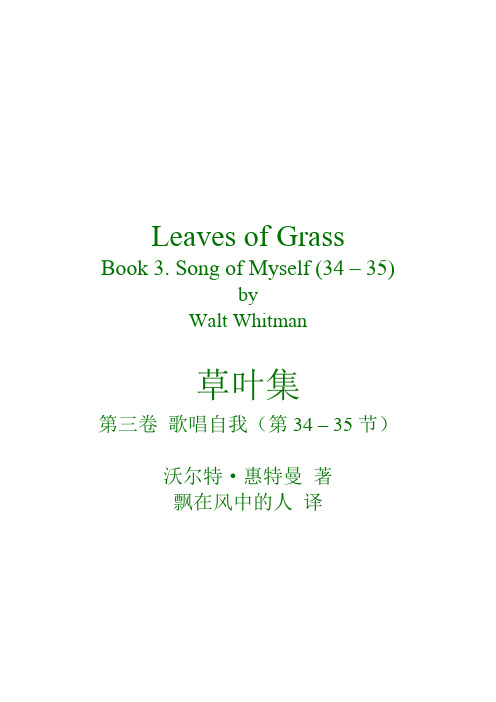
Leaves of Grass Book 3. Song of Myself (34 – 35)byWalt Whitman草叶集第三卷歌唱自我(第34 – 35节)沃尔特·惠特曼著飘在风中的人译LEAVES OF GRASS草之叶Come, said my soul,来吧,我的灵魂说道,Such verses for my Body let us write, (for we are one,)为了我的肉体,让我们写下这些诗,(因为我们是密不可分的整体)That should I after return,这样如果以后我将归来,Or, long, long hence, in other spheres,也许,在很久,很久以后,在另外的星体或空间,There to some group of mates the chants resuming,在那里朝着某一群伙伴,我将把这些颂歌重新颂唱,(Tallying Earth’s soil, trees, winds, tumultuous waves,)(把地球的土壤、树木、风儿和汹涌波浪逐一地清点)Ever with pleas’d smile I may keep on,我会带着喜悦的微笑永不放弃,Ever and ever yet the verses owning—as, first, I here and now永永远远地把这些诗篇拥有——就像此时此刻的我一样,首先,Signing for Soul and Body, set to them my name,为了灵魂和肉体而签下名字,把我的名字嵌在它们上面。
Walt Whitman沃尔特·惠特曼BOOK III第三卷S ONG OF M YSELF歌唱我自34Now I tell what I knew in Texas in my early youth,现在我来讲讲我少年时在德克萨斯听到的一个故事,(I tell not the fall of Alamo,(我讲的不是阿拉莫的陷落,Not one escaped to tell the fall of Alamo,那一次没有人活着逃出,来讲述阿拉莫的陷落,The hundred and fifty are dumb yet at Alamo,)阿拉莫的那一百五十个人啊,仍旧闭着嘴巴。
惠特曼英文简介

惠特曼英文简介沃尔特·惠特曼,美国著名诗人、人文主义者,他创造了诗歌的自由体,下面是店铺为你整理的惠特曼英文简介,希望对你有用!沃尔特·惠特曼简介Walt Whitman (Walt Whitman, May 31, 1819 - March 26, 1892) was born in Long Island, New York, a famous American poet, humanist, who created the free body of poetry ), Its representative works are poems "grass leaves set".沃尔特·惠特曼生平简介BornPoet. May 31, 1819 was born in Long Island. The father was farming, and the poor moved to Brooklyn, working as a carpenter and building a house. He was interested in the imagination of the socialist thinker and the composer of the democratic thinker, Paine. Whitman studied in public schools, served as rural teachers; childhood also had a messenger, learned typography. Later in the newspaper work, has become editor. He likes to wander, meditate, and enjoy the beauty of nature; but he prefers the city and the streets, like opera, dance, speech, like reading Homer, Greek tragedy and Dante, Shakespeare's works. From February 1846 to January 1848, he was editor of the "Brooklyn Eagle". In 1848 went to New Orleans to edit the newspaper and soon returned to Brooklyn. After five or six years, he helped the old father to build a house, operating a small bookstore, a small printing factory, free to loose, free to wander; and teenager, enjoy and boatman, navigator, coachman, mechanic, fisherman , Handyman, etc. make friends.Grass set1855 "grass leaves set" the first version of the advent of atotal of 12 poems, and finally out of the 9th edition of a total of 383 poems. One of the longest one, that is later known as the "song of their own" that poem. A total of 1336 lines. The content of this poem almost includes the author's main thought of his life, is one of the most important poems of the author. The poem has repeatedly mentioned the grass leaves: grass leaves symbolize all ordinary, ordinary things and ordinary ordinary people. This epic poetry is universally cold, and only Emerson wrote a warm letter to the poet. Whitman received great encouragement from this letter."Grass set" is the most important work of Whitman poetry, named after the concentration of such a poem: "Where there is soil, where there is water, where the long grass." Poems in the poems like the United States The earth's grass, vibrant and exudes attractive aroma. They are world famous masterpiece, created a new era of American national poetry. The author has bold innovation in the form of poetry, created the "free body" of the poetic form, breaking the traditional poetry of the law, to break the sentence as the basis of rhythm, the rhythm of free and unrestrained, Wang Yang unrestrained, Shu volume freely, with blew of momentum and no Not the capacity of the package.1856, the second edition of "grass leaves set" published a total of 32 poems. "All the way through the Brooklyn ferry" is one of the poet's best works. In addition, "the song", "song of the road" is also famous.In 1859, "Saturday Weekly" published on the Christmas number of Whitman's excellent lyrics "from the never-ending swing in the cradle", this is a love and death of the carol. The next year should be a publication of Boston, please print the "grass leaves set" version 3, this poem is the first "official publication".There are 124 new poems, including "from the never-ending swing cradle" and three groups were named "song of democracy", "Adam's descendants", "reed" poetry.War eraDuring the Civil War, Whitman, as a firm democratic fighter, showed his deep humanitarian character. When the war intensified, he took the initiative to Washington to serve as a nurse, all day care and injury of the soldiers, resulting in serious damage to health. His life is very hard, by copying the date, the money saved in the sick and wounded. He served as a nurse for nearly two years, approaching about 100,000 soldiers, and many later kept in touch with him.Postwar lifeAfter the war, Whitman was appointed as a small staff member of the Indian Affairs Office of the Ministry of the Interior. Soon the minister found that he was the author of the "Grass Leaf Set" and dismissed him; he later served in the office of the Minister of Justice for eight years. As a result of the exercise in the civil war, increased experience, political thought has also been improved, his creation has entered a new stage. In 1865, Whitman in New York at their own expense printed his poems in the late civil war "桴 drum set", which received a total of 53 new poems. A few months later he published a sequel, including the memorial Lincoln's famous "recently lilac in the courtyard when the open."沃尔特·惠特曼作品出版情况In 1867 the "grass leaves set" fourth edition only eight new poems, but the income of the "drum set" and its sequel. It is worth noting that the long article published in 1871 "democratic vision", it summed up the author's literary and political ideas.The fifth edition of the "Grass Leaf Set" was printed once in 1871 and 1872.The first income of 13 new poems, the second income general critics recognized as the poet's last important long poem "Road to India" and a few new poems. In January 1873 Whitman was suffering from paralysis, writing ability from also depressed. But his optimism, love and sensitivity to life, his ideal of democracy, or so to death. His old age depressed unsuccessful, in addition to the preparation of several versions, and occasionally write some poetry. In 1876, the 6th edition of the "Grass Leaves" was published to commemorate the 100th anniversary of the Declaration of Independence. This is a collection of essays, including the two volumes, the first volume of the fifth edition of the content, the second volume he named "two streams", including prose, 18 new poems, "leading to India Road "and poems, poems tend to abstract. The text of the seventh edition (1881-1882) of the "Grass Leaf Set", the title of each poem and the order of the arrangement, have been finalized, and this edition has received 20 new poems. Whitman continued to write poetry until his death in 1892.In 1882 the poet published his essay collection "Typical Days", which included the "democratic vision" article. Published in 1888, "November", the income of 62 new poems and some articles, concentrated poems later income "grass leaves set" 8th edition (1889), and become "poem". In 1891 Philadelphia's publisher published Whitman's new work "Goodbye, my fantasy", where the poem became "grass leaves" and "poem". "9" (1892), including "poem", "seventy years" and "attached poem two" "goodbye, my fantasy." Poet after the death of the poem "Elderly echo", as "with poetry". See 1897 to 1898 published collection,after the collection of the whole collection also income. After 1898 the universal collection, is the so-called "dying version", that is published in 1892 edition 9."Flying in freedom and strength" was incorporated into the second edition of the first semester of the seventh edition of the seventh edition.。
leaves of grass草叶集作者简介加赏析

• 即使世界上再没有人意识到这一点,我仍满足地坐着,
• 即使世上所有的人都意识到,我也满足地坐着。
ห้องสมุดไป่ตู้
Nature
• I believe in those wing’d purposes, • And acknowledge red, yellow, white, playing within me, • And consider green and violet and the tufted crown intentional, • And do not call the tortoise unworthy because she is not something else, • And the jay in the woods never studied the gamut['gæmət] , yet trills pretty well to me, • And the look of the bay mare shames silliness out of me. (section 13)
• Through me forbidden voices, • Voices of sexes and lusts, voices veil’d and I remove the veil, • Voices indecent by me clarified and transfigur’d. • • • • I do not press my fingers across my mouth, I keep as delicate around the bowels as around the head and heart, Copulation is no more rank to me than death is. (section 24)
- 1、下载文档前请自行甄别文档内容的完整性,平台不提供额外的编辑、内容补充、找答案等附加服务。
- 2、"仅部分预览"的文档,不可在线预览部分如存在完整性等问题,可反馈申请退款(可完整预览的文档不适用该条件!)。
- 3、如文档侵犯您的权益,请联系客服反馈,我们会尽快为您处理(人工客服工作时间:9:00-18:30)。
Leaves of Grass: Subjects and Style
Whitman's poetry is democratic in both its subject matter and its language. We see Whitman breaking new ground in both subject matter and diction. Subjects: the new America; himself The stated mission of his poetry was, in his words, to make "[a]n attempt to put a Person, a human being (myself, in the latter half of the 19th century, in America) freely, fully, and truly on record."
Leaves of Grass
The critical and popular response to Leaves of Grass was mixed and bewildered. The majority of the readers who happened to have come upon the book seem to have been simply indifferent.
Leaves of Grass: Subjects and Style
Whitman's great subject was America, but he wrote on an expansive variety of smaller subjects to accomplish the task of capturing the essence of this country. Some of his many subjects included slavery, democracy, the various occupations and types of work, the American landscape, the sea, the natural world, the Civil War, education, aging, death and immortality, poverty, romantic love, spirituality, and social change.
Leaves of Grass
Well-known poems in the 1855 edition include "Song of Myself," a long poem in fifty-two sections, which is considered by many to be his masterpiece. It contains such notable lines as "I am large, I contain multitudes" and "I bequeath myself to the dirt to grow from the grass I love, / If you want me again look for me under your boot-soles."
Leaves of Grass: Imagery
Imagery is any literary reference to the five senses (sight, touch, smell, hearing, and taste). Essentially, imagery is a group of words that create a mental image. Such images can be created by using figures of speech such as similes, metaphors, personification. Imagery is also the term used to refer to the creation (or re-creation) of any experience in the mind .
Leaves of Grass: Subjects and Style
Whitman's greatest legacy is his invention of a truly American free verse. Although written in free verse, meaning that it is not strictly metered or rhymed, sections of Leaves of Grass approach iambic meter.
Leaves of Grass: Subjects and Style
Meter: a rhythm of accented and unaccented syllables which are organized into repeated patterns, called feet. Iambic: a foot consisting of an unaccented and accented syllable. Shakespeare often uses iambic, for example the beginning of Hamlet's speech, "To be or not to be. " "Come live with me and be my love."
Leaves of Grass
Upon publication, he sent a copy to Ralph Waldo Emerson. The letter from Emerson included the now famous line: "I greet you at the beginning of a great career.“ Leaves of Grass grew through its five subsequent versions in eight editions into a hefty book of 389 poems, in fourteen sprawling sections: Each section is selfcontained, as if it were aves of Grass: Subjects and Style
Trochaic: a foot consisting of an accented and unaccented syllable. Longfellow's Hiawatha uses this meter, which can quickly become singsong (the accented syllable is italicized): "By the shores of GitcheGumee By the shining Big-Sea-water." The three witches' speech in Macbeth uses it: "Double, double, toil and trouble."
Leaves of Grass
Reactions to Whitman have been at both extremes: his book has been banned for sensuality one decade, and then praised as the cornerstone of American poetics the next. With the upcoming 150th anniversary, America's poets and critics have found unmediated love for our most American poet, the man who came to shape their ideas of nationhood, democracy, and freedom. It is unlikely to become a buried masterpiece again.
Leaves of Grass
On July 4, 2005, we celebrated the 150th anniversary of what is possibly the greatest book of American poetry ever written. in 1855, Walt Whitman published his first edition of Leaves of Grass, a slim volume consisting of twelve untitled poems and a preface.
Leaves of Grass
A few weeks after the book’s publication, Emerson acknowledged the gift in a letter in which declared that he found "incomparable things said incomparably well" in Leaves of Grass. The praise from the author of "Self-Reliance" and "The Poet" was enough to outweigh the indifference or hostility of all other readers and to start Whitman on his plans for the 1856 edition.
